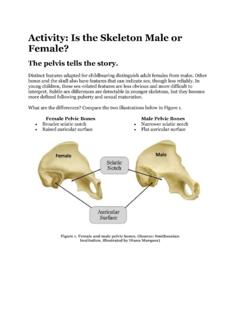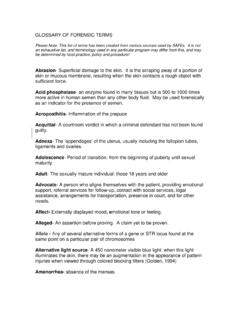Transcription of CCAC / Pitt Connection Transfer Guide
1 CCAC / Pitt Connection Transfer Guide Office of Admissions and Financial Aid University of Pittsburgh 3/15/2021 Dear Prospective Transfer Student, Greetings and welcome to the online version of the CCAC/Pitt Connection Transfer Guide . I hope that you find it to be a useful tool as you plan your academic program in anticipation of your successful Transfer from CCAC to the University of Pittsburgh. I also encourage you to work closely with both your Transfer Counselor at CCAC and the Office of Admissions and Financial Aid at Pitt as you plan your coursework. We look forward to your becoming a member of the University of Pittsburgh community and to working with you as you pursue your academic and professional goals. Good luck with your studies and remember to keep in touch as you progress toward your Transfer to the University of Pittsburgh. Best Wishes, DeLane Crutcher Associate Director Office of Admissions and Financial Aid Using the Pitt Connection Transfer Guide The Pitt Connection Transfer Guide is a resource designed to assist you with: Planning your CCAC coursework Maximizing the number of credits you can earn at CCAC Learning important information about academic requirements at Pitt It is divided into several sections.
2 First, you should familiarize yourself with the University s General Transfer Policies. Next, the Bachelor of Arts and Bachelor of Sciences Kenneth P. Dietrich School of Arts and Sciences Degree Requirements section includes a worksheet that you can use to keep track of the courses that you have completed that will satisfy those requirements at Pitt. The section on Transferable Courses contains an alphabetical listing of all the community college courses that will Transfer to Pitt. The CCAC course is listed in the first column, its Pitt equivalent (if one exists) is in the second and third columns, the number of credits it will Transfer as is in the fourth column, and the specific Pitt graduation requirement (Foundational Skills, Disciplinary Approaches, or Elective) that it satisfies is in the fifth column. Use this section in conjunction with the worksheet to chart your progress. There are also sections that include information about Transfer to the College of Business Administration, College of General Studies, and the Schools of Computing and Information, Education, Engineering, Health and Rehabilitation Sciences, Nursing, Pharmacy, and Social Work.
3 IMPORTANT: The provisions and contents of this document are subject to change at any time at the University s sole discretion. It is intended to serve only as a general source of information about the University and is in no way intended to state or imply contractual terms. Dietrich School of Arts and Sciences General Transfer Policies The Kenneth P. Dietrich School of Arts and Sciences offers the degrees of Bachelor of Arts and Bachelor of Science. All natural science majors are awarded Bachelor of Science Degrees. If you complete a major outside the natural sciences, you will be awarded the Bachelor of Arts Degree. GENERAL GUIDELINES FOR CREDIT Transfer TO Arts and Sciences: All credits available for Transfer are subject to the following guidelines. 1. Only courses that have reasonable counterparts in the School of Arts and Sciences curriculum are eligible for Transfer (see guideline 6 for exception). 2. The number of credits granted for a given course cannot exceed the number on the transcript from the school where they are earned, nor, usually, can it exceed the number earned in the corresponding course in the School of Arts and Sciences.
4 3. No Transfer credits can be part of the final 30 required for a degree. These must be earned in residence. In interpreting this regulation, credits earned on regional campuses are considered as Transfer . 4. All Transfer credits must have been earned within 12 years of the date when the Arts and Sciences degree requirements will be completed. 5. All Transfer credits are subject to re-evaluation if and when you Transfer from one school to another within the University of Pittsburgh. 6. A maximum of 18 non-School of Arts and Sciences credits may be counted in the minimum of 120 required for graduation. 7. If another school at Pitt transfers a class, it can be transferred to Arts and Sciences in the non-CAS (NONCAS) category. A maximum of 18 credits in this category can count towards graduation. 8. At least 50 percent of the credits required in your major and official minor must be earned in the School of Arts and Sciences. 9. Not more than 60 credits may be transferred from a two-year college.
5 No more than 90 may be transferred from a four-year college. If 60 or more credits have been earned at a four-year school, no Transfer credit will be granted for credits earned subsequently at a two-year school. 10. If a course for which advanced-standing credit has been granted is repeated, the advanced-standing credit is canceled. 11. Course work earned in approved foreign study programs may not constitute more than 15 of the final 30 credits. These credits are awarded on a Satisfactory/Audit basis. In addition, 30 of the last 60 credits must be earned in residence. CLEP: CLEP (Credit for Life Experience) credits do not Transfer to the Dietrich School of Arts and Sciences. GUIDELINES AND SUGGESTIONS FOR STRUCTURING YOUR CURRICULUM: The structure of a degree from Arts and Sciences varies depending on your major and how many classes you need to take to fulfill skills and graduation requirements. Typically, Skills and General Education requirements fill from 51 to 68 of the 120 credits required for a degree, and your major, from 30 to 64 credits.
6 If you wish to Transfer to the School of Arts and Sciences at Pitt in the future, we suggest that you concentrate on the following at your present college: 1. Satisfy the Skills requirements, , Composition, Algebra, Second Language (algebra and general writing MUST be completed before Transfer to Arts and Sciences). 2. Begin taking comparable courses to meet the General Education Requirements. 3. Begin taking the introductory courses in your expected major. Bachelor of Arts and Bachelor of Science Arts and Sciences Degree Requirements The faculty of the Dietrich School of Arts and Sciences has defined a set of curricular requirements to be satisfied by all Arts and Sciences students. These requirements, which form the foundation of a liberal arts education, are of two types: Foundational Skills and Disciplinary Approaches. A. FOUNDATIONAL SKILLS REQUIREMENTS: These requirements assist students in developing the skills in writing and quantitative reasoning that provide the foundation for future learning.
7 (Minimum 6 credits) 1. Writing Requirements: The writing requirement consists of: a. Basic Writing_____ b. Seminar in Composition_____ c. Writing Intensive courses (2): The W-courses involve a significant amount of writing and are taken by students after they have completed the General Writing requirement. Community College students should take them after they Transfer . 2. Quantitative and Formal Reasoning a. Algebra_____ b. Quantitative_____ B. Disciplinary Approaches (46 credits) 1. Humanities Requirements: a. First Level Literature:_____ b. First-level Music or Art:_____ c. Creative Expression/Second Level Literature or Art: _____ d. Philosophy:_____ 2. Social Science Requirements a. Social Science:_____ b. History:_____ 3. Natural Science Requirements: Three courses in the natural sciences that introduce students to scientific principles and concepts. Students must take courses from at least two different departments.
8 A. Course one:_____ b. Course two:_____ c. Course three:_____ 4. Global Citizenship Requirement Second Language (Two-term sequence of the same language equivalent to Pitt number) a. Level One_____ b. Level Two_____ A sequence of two courses in a Second Language: All students are required to complete with a grade of C or better two terms of university-equivalent study in a second language other than English. Exemptions will be granted to students who can demonstrate elementary proficiency in a second language through one of the following: a) having completed three years of high school study of a second language with a grade of B or better in each course; b) passing a special proficiency examination; c) transferring credits for two terms or more of approved university-equivalent instruction in a second language with grades of C or better; d) having a native language other than English. Foreign Culture/International Courses There are three categories: Regional (R), Comparative (C) and Global (G).
9 At least two of the three categories must be covered with (a), (b), and (c). Category (d) must be a non-western (NW) course, which may overlap with another general education requirement. a. _____ b. _____ c. _____ d. _____ (Non-Western). CCAC Courses Transferable To The University of Pittsburgh Community College of Allegheny County Course # Pitt Course # Pitt Course Title # CR Curricular Requirement ACC 104-Financial Accounting BUSACC 0030 Financial Accounting 4 Elective (NONCAS) ACC 203-Managerial Accounting BUSACC 0040 Managerial Accounting 3 Elective (NONCAS) ACJ101-Introduction to Law Enforcement and Public Safety NONCAS 3 Elective(NONCAS) ACJ 201-Fundamentals of Criminal Justice NONCAS 3 Elective(NONCAS) ACJ 202-Criminal Law NONCAS 3 Elective(NONCAS) ACJ 203-Evidence and Procedures NONCAS 3 Elective(NONCAS) ACJ 205-Introduction to Criminalistics NONCAS 3 Elective (NONCAS) ACP-Activities Professional NA Nothing from this area transfers NA NA ALH 111-Intro to Health Care Organizations NONCAS 3 Elective (NONCAS) ALH 112-Health Issues and Occupations NONCAS 3 Elective (NONCAS) ALH 125-Pharmacology NONCAS 3 Elective (NONCAS)
10 ALH 140-Medical Terminology NONCAS 3 Elective (NONCAS) ALH 142-Trends/Issues in Health Care NONCAS 3 Elective (NONCAS) ALH 230-Nonviolent Crisis Intervention NONCAS 3 Elective (NONCAS) ANT 101-Intro. To anthropology ANTH 0000 3 Social Science ANT 102-Introduction to Cultural anthropology ANTH 0780 Intro. To Cultural anthropology 3 Social Science ANT 103-Physical anthropology ANTH 0680 Introduction to Human Evolution 3 Natural Science ANT 104- Native American Indians of North America ANTH 0000 3 Elective ANT 110- forensic anthropology ANTH 0630 forensic anthropology 3 Natural Science Community College of Allegheny County Course # Pitt Course # Pitt Course Title # CR Curricular Requirement ANT 117-Globalization ANTH 0000 3 Elective ANT 991- anthropology Elective Not transferable AOP-Administrative Office Professional NA Nothing from this area transfers NA NA ARA 101-Elementary Arabic 1 LING 0000 3 Elective ARA 102-Elementary Arabic 2 LING 0000 3 Elective ART 103-Art History Ancient HAA 0000 Only one ART 103 or 104 can Transfer 3 Music/Art I ART 104-Art History Modern HAA 0070 European Visual Traditions Renaissance - Only one ART 103 or 104 can Transfer 3 Music/Art I ART 106-Art Appreciation HAA 0010 Introduction to World







